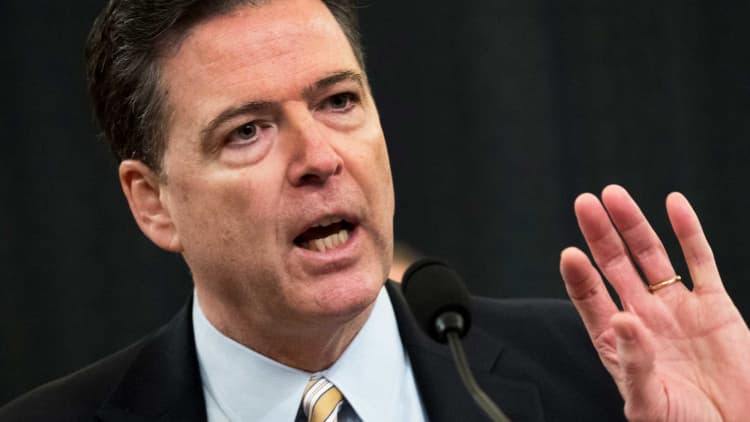
It can be hard to keep up with everything that has unfolded since President Donald Trump abruptly fired former FBI Director James Comey nearly a month ago, but with Comey's first public comments since then, here's a timeline:
July 5, 2016: Comey recommends that the Justice Department not charge Hillary Clinton, the eventual Democratic presidential nominee, for her handling of classified information at the State Department. Republicans express outrage at Comey.
Oct. 28: In a letter to Congress just days before the Nov. 8 presidential election, Comey says the FBI uncovered new emails that could be related to the Clinton investigation. Democrats express outrage at Comey.
Nov. 6: Comey says the FBI is not changing its conclusion on Clinton.
Jan. 6: Comey briefs Trump on the Russian effort to influence the 2016 election. Comey tells Trump he is not personally under FBI investigation and begins to document his conversations with Trump immediately after they take place, according to his prepared statement for Thursday's hearing released by the Senate Intelligence Committee.
Jan. 27: Trump and Comey have a one-on-one dinner seven days after the president is sworn in, at which Comey gets the impression that the president wants to "create some sort of patronage relationship." Comey will testify that Trump said, "I need loyalty, I expect loyalty." Comey says he promised only "honest loyalty."
Feb. 14: In an Oval Office meeting, Comey believes Trump asks him to "drop" an investigation into former national security advisor Michael Flynn. (Flynn was fired for lying to Vice President Mike Pence about his links to Moscow.) Comey does not make that pledge and does not believe Trump was requesting that he drop the FBI's broader Russia investigation.
March 20: Comey publicly confirms what has been reported for months: "The FBI, as part of our counterintelligence mission, is investigating the Russian government's efforts to interfere in the 2016 presidential election. And that includes investigating the nature of any links between individuals associated with the Trump campaign and the Russian government, and whether there was any coordination between the campaign and Russia's efforts."
March 22: Trump asks Director of National Intelligence Dan Coats if he could intervene with Comey and get him to ease off Flynn, according to The Washington Post. Coats tells other officials about the exchange and says what Trump suggested would be inappropriate, according to the newspaper.
March 30: Trump calls Comey and describes the Russia probe as a "cloud" over his administration, according to Comey. Trump asks Comey to "get that fact out" that the president is not personally under investigation.
April 11: Trump calls Comey and again asks for him to "get out" that the president is not personally under investigation, according to Comey, who adds that this is the last time he talked to Trump before the president fired him.
May 3: During a routine oversight hearing before the Senate, Comey is questioned about the timing of his announcement prior to Election Day that the FBI has come across another batch of Clinton emails. He says it makes him "mildly nauseous to think that we might have had some impact on the election" but adds, "I would make the same decision."
May 9: Trump abruptly fires Comey. The White House quickly claims that the president ousted Comey because of a Justice Department criticism of his job performance.
May 10: In an Oval Office meeting, Trump tells top Russian diplomats that Comey "was crazy, a real nut job," according to the Times. Trump adds: "I faced great pressure because of Russia. That's taken off."
May 11: Trump directly contradicts his own staff from two days earlier, telling NBC News that he would have fired Comey "regardless" of what the Justice Department said. Trump adds that he was considering "this Russia thing" when he ousted the FBI director. Trump also claims that Comey told him three separate times that he was not personally under investigation.
May 17: Deputy Attorney General Rod Rosenstein appoints former FBI Director Robert Mueller as special counsel to oversee the Russia probe.
May 19: Comey agrees to testify before the Senate Intelligence Committee.
June 5: After the Senate hearing date is announced, the White House says Trump will not use executive privilege to try to block Comey's testimony.
June 6: Asked if he has a message for Comey, Trump says, "I wish him luck."
June 7: DNI Coats does not comment in an open Senate hearing about his specific conversations with Trump, but says he never felt "pressured" to influence an investigation. Comey's prepared statement for the next day's hearing is released. Trump's lawyers says the president feels "vindicated" by the testimony.
June 8: Comey testifies before the Senate committee, saying The White House's criticism of the FBI "were lies plain and simple." The hearing is part of the panel's probe into Russian interference in the 2016 election and any links between the Trump campaign and the Kremlin.


